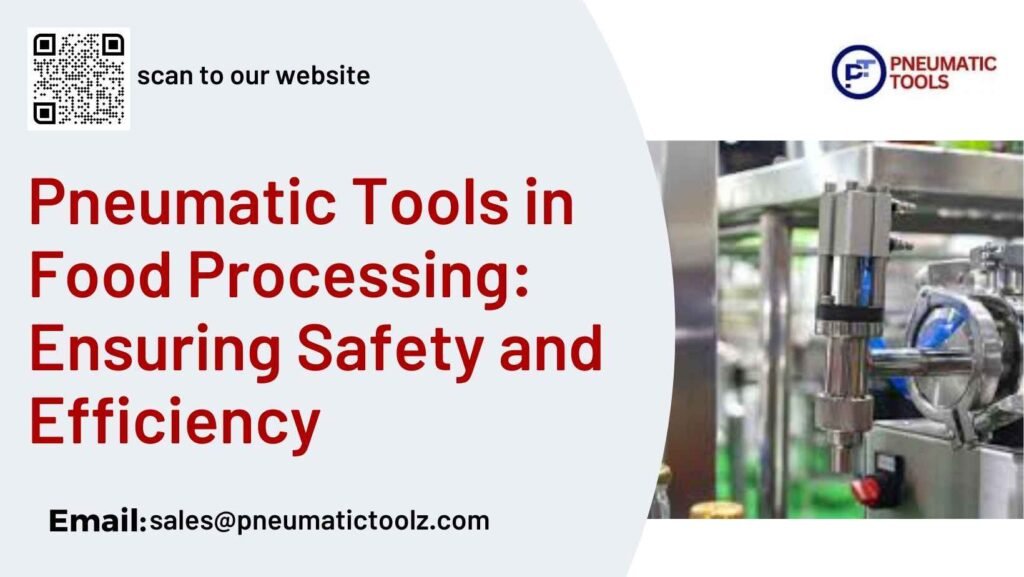Key Takeaway
Pneumatic tools offer significant advantages in the food processing industry by ensuring safety, hygiene, and efficiency. Their spark-free and non-electrical design reduces contamination risks, while their durable and low-maintenance nature boosts productivity. These tools help food processing businesses meet stringent safety standards while optimizing operations for cost-effectiveness and reliability.
Introduction
Pneumatic tools play a crucial role in the food processing industry, offering a combination of safety, cleanliness, and efficiency that is essential for maintaining high standards of production. As the industry operates under strict hygiene regulations, pneumatic tools, powered by compressed air rather than electricity, are ideal due to their minimal risk of contamination, ease of cleaning, and ability to handle demanding tasks.
Key Benefits of Pneumatic Tools in Food Processing:
- Enhanced Safety: Pneumatic tools eliminate the risk of sparks, making them safer in environments with flammable materials. Additionally, their non-electrical design reduces the risk of electric shocks in wet conditions, which is common in food processing plants.
- High Efficiency: These tools provide high-speed, reliable performance, which helps optimize production lines. Whether cutting, packaging, or assembling, pneumatic tools reduce downtime and improve the speed of repetitive tasks.
- Hygiene and Cleanliness: Since pneumatic tools do not use lubricants that can leak or mix with food products, they meet stringent hygiene requirements. They are also easier to sterilize, ensuring they meet food safety standards.
- Durability: Designed to withstand rigorous use, pneumatic tools are highly durable and low-maintenance, offering long-term operational benefits in demanding environments like food processing plants.
- Cost-Effective: Despite their power, pneumatic tools are generally more cost-effective to operate over time, as compressed air systems are relatively simple and require less energy than their electric counterparts.
Applications in Food Processing:
- Packaging: Pneumatic staplers, nailers, and sealers are used to secure packaging efficiently.
- Cutting and Slicing: Pneumatic cutting tools are used for precision slicing and cutting in meat, seafood, and bakery production lines.
- Material Handling: Pneumatic conveyor systems help in transporting raw materials and finished products safely across production areas.
- Cleaning: Air-powered tools and blowers help remove dust and debris from equipment and working surfaces, maintaining cleanliness.
FAQs
1. Why are pneumatic tools preferred in food processing over electric tools?
Pneumatic tools are preferred because they are powered by compressed air, making them safer in wet environments where electric shocks are a risk. They also minimize contamination as they do not use oil-based lubricants that could leak into food products.
2. How do pneumatic tools contribute to hygiene in food processing?
Pneumatic tools are easier to clean and maintain, and they don’t produce sparks or electric hazards. Since they operate without lubricants, they reduce the risk of contamination in food processing environments that require strict hygiene.
3. Are pneumatic tools cost-effective for food processing plants?
Yes, pneumatic tools are generally more cost-effective in the long term. They are durable, require minimal maintenance, and are energy-efficient since compressed air systems are less expensive to operate compared to electrical systems.
4. What types of pneumatic tools are commonly used in food processing?
Common pneumatic tools in food processing include pneumatic staplers, nailers, sealers for packaging, air-powered cutting and slicing tools, material handling systems, and cleaning equipment like blowers to remove debris.
5. Can pneumatic tools be used in environments with flammable materials?
Yes, pneumatic tools are ideal for environments with flammable materials because they do not generate sparks, unlike electric tools, making them safer to use in sensitive areas.
6. How do pneumatic tools improve efficiency in food processing?
Pneumatic tools offer high-speed performance, reducing the time needed for repetitive tasks like cutting, packaging, and material handling. They also have low downtime and require less maintenance, contributing to smoother operations.
7. What safety features do pneumatic tools offer for food processing?
Pneumatic tools offer several safety features, such as non-sparking operation, reduced electric hazard risks, and precise control for handling delicate food products, ensuring both worker safety and product quality.
8. Can pneumatic tools help with energy conservation in food processing?
Yes, pneumatic systems are often more energy-efficient than electrical systems, particularly when integrated into larger, centralized compressed air systems. This can help reduce energy costs in food processing plants.
Related Articles:
Ergonomics and Safety Innovations in Pneumatic Tool Design
Emerging Trends in Pneumatic Tool Technology: What to Expect in 2025
The Psychology of Tool Selection: Why We Choose Certain Pneumatic Tools
Conclusion
Pneumatic tools have become a vital component in the food processing industry, offering unmatched safety, efficiency, and reliability. Their non-electrical nature minimizes risks such as electrical shocks and contamination, ensuring compliance with strict hygiene standards. With their ability to handle repetitive, high-demand tasks while remaining cost-effective and durable, pneumatic tools significantly enhance productivity in food processing environments. As food safety regulations continue to evolve, the adaptability and cleanliness of pneumatic systems will remain crucial in maintaining high standards.
The integration of pneumatic tools in the food processing industry ensures not only greater operational efficiency but also compliance with safety and sanitation standards. Their ability to handle high-demand tasks while remaining safe and cost-effective makes them indispensable for modern food processing plants.
Call to Action
To explore pneumatic tools tailored for food processing and enhance the safety and efficiency of your operations, visit pneumatictoolz.com or reach out to our team at sales@pneumatictoolz.com for personalized assistance. By investing in pneumatic tools, food processing businesses can improve operational efficiency, safeguard their workers, and ensure consistent product quality.



